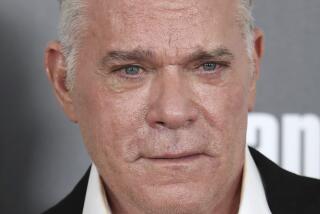Giving Kids Someone to Count On : Man Whose Story Was Told in Film ‘Midnight Express’ Is Volunteer Mentor
It’s been almost two decades since the young American Billy Hayes escaped the Turkish prison where he survived a grueling five years for hashish smuggling, a story that became famous when it was depicted in the 1978 film, “Midnight Express.”
Hayes, 46, has long since turned his life around. He’s in show business, as an actor, writer, director--he was nominated by the Los Angeles Drama Critics Assn. in 1992 for the play “Cock and Bull Story”--and producer, with a CBS television movie in development.
And for the past three years, he has tried to help some of Hollywood’s street kids turn their lives around by volunteering as a mentor with the Los Angeles Free Clinic’s Project STEP (Short Term Employment Program).
*
Based at the Free Clinic’s Hollywood Boulevard center, the program provides homeless and high-risk youth with day labor while it helps them develop skills to find permanent jobs. Each mentor spends at least an hour a week with a young person over a period of several months.
“I don’t have answers to a lot of things, but I know how to get them--how to get a driver’s license, how to apply for a job, how to write a resume, how to be sexually aware, which is life and death on the street,” Hayes says.
“It’s also about being a friend,” he adds. “I can give advice like ‘Don’t get arrested in Turkey,’ but a lot is really about following through on a commitment--being there. Most of these kids don’t have anyone to count on. They’ve had less than ideal home circumstances, no support there, so they’ve left and found themselves here on the street.”
Hayes says his prison experience has proved an asset. “It gives me some sort of weird validation, talking about the street, about the less than ‘straight’ world,” he says. “To a lot of them here, the straight world is an anathema. In the ‘60s, I roamed the world, lived in strange ways.”
Hayes is working with his third Free Clinic client, 23-year-old Seven Jenkins, a drummer with a group called BBQ. When Jenkins shows up for their weekly session, they discuss openings for bus boys at a new local restaurant, and Hayes offers Jenkins a ride there.
Hayes has taught all three of his clients to drive--on his own time to avoid possible insurance problems for the clinic. Jenkins is still learning; Hayes’ two previous charges acquired driver’s licenses with his help.
“I was amazed--nobody had talked to these guys about how to drive,” he says. “It’s something so basic. It gives you independence.”
Some of his work produces less tangible results. Hayes discussed his early years with Jenkins to make a connection between his tumultuous past and the creative life he now leads, and he used his director’s eye to comment on the rapport between drummer and audience when he watched Jenkins perform recently.
“When I got out of prison, I was a folk hero,” Hayes says. “I was suddenly famous for being an escaped convict-drug smuggler. That’s not what I want.
“I want to do something to change the world, but it’s hard to do that in a big way. It’s easier in small amounts and actually more practical, too, on a day-to-day basis. We could use a lot more mentors here--every kid you take off the street is one less potential homeless person or crime victim.
“It’s a great way for the community to help itself. And it’s expanded my life, meeting these kids instead of focusing on my own problems. As trite as it sounds, you really do get more out of it than you put in.”
For information about becoming a Project STEP mentor, call Steve Knight at (213) 462-8632.)
More to Read
Only good movies
Get the Indie Focus newsletter, Mark Olsen's weekly guide to the world of cinema.
You may occasionally receive promotional content from the Los Angeles Times.






